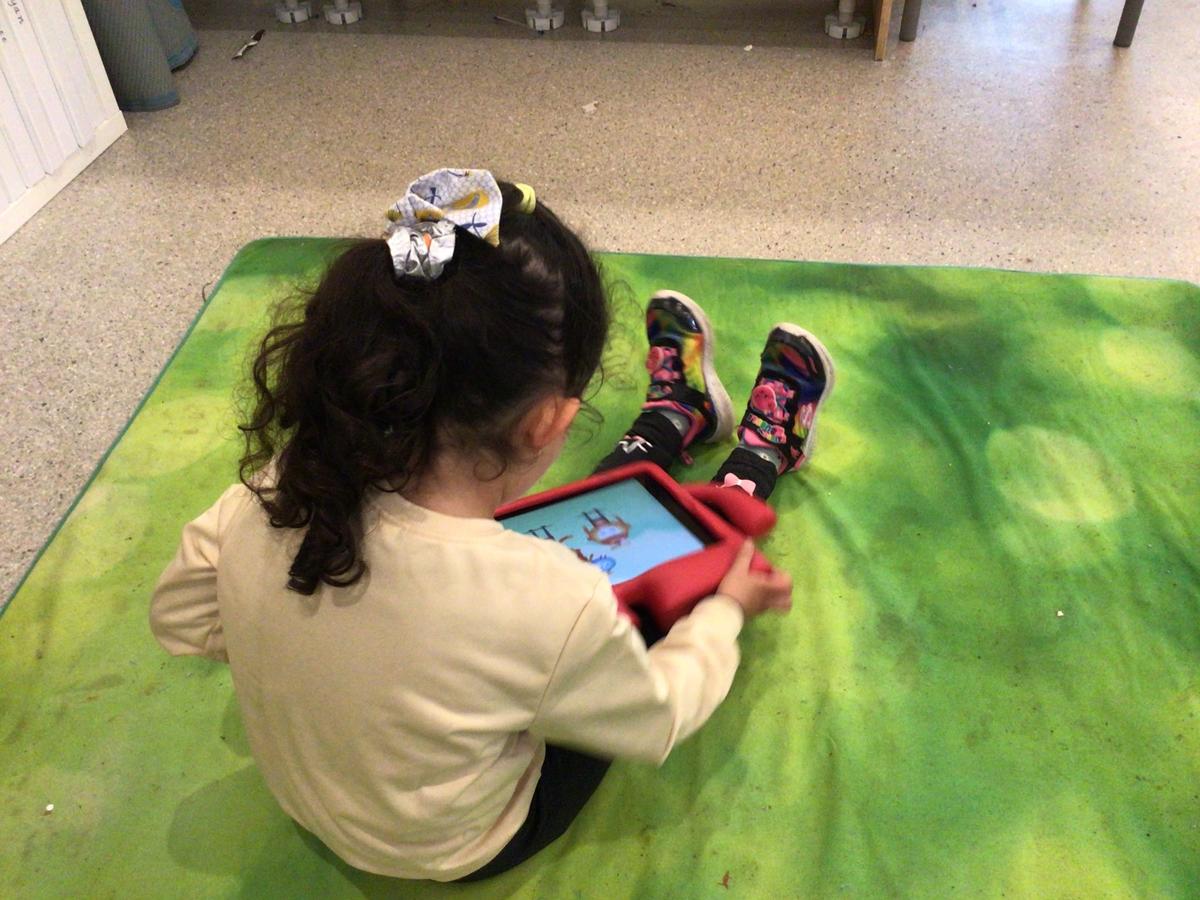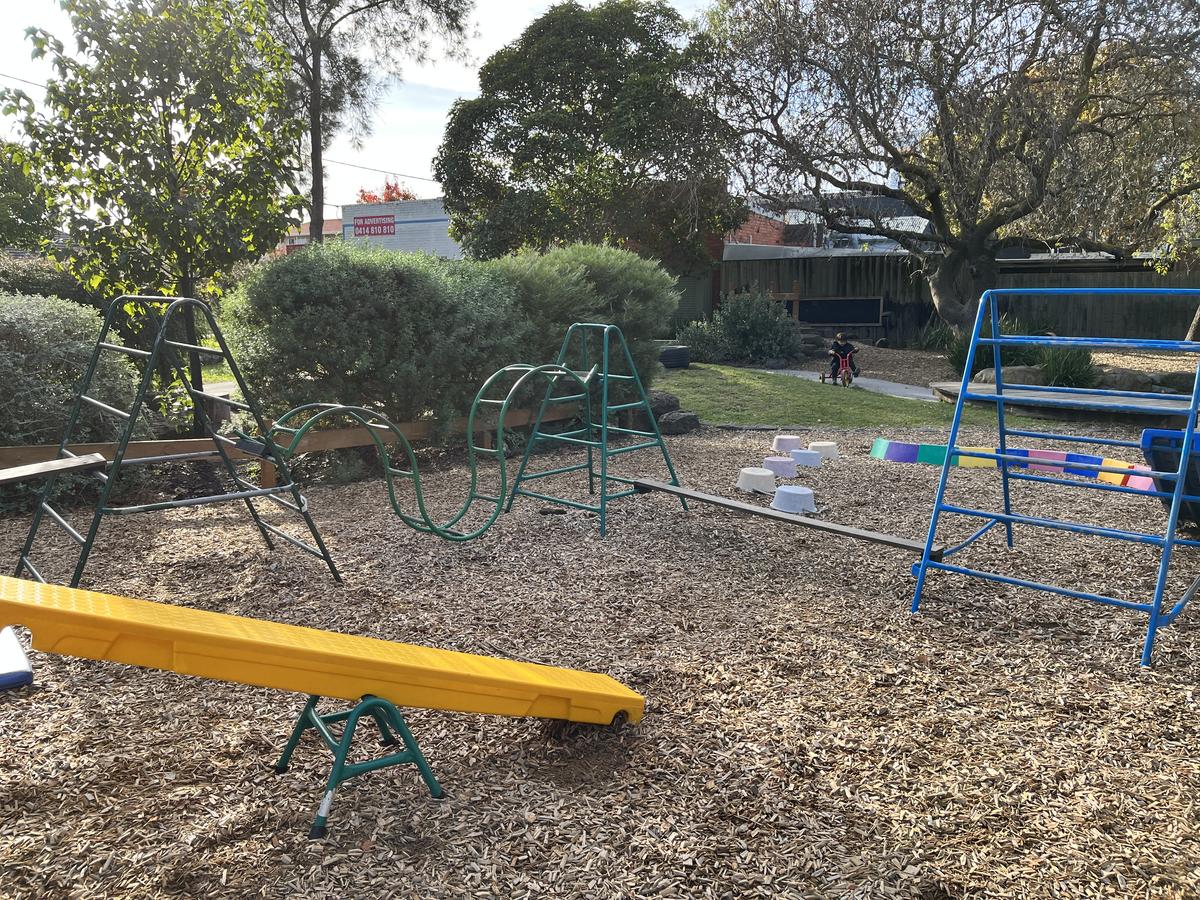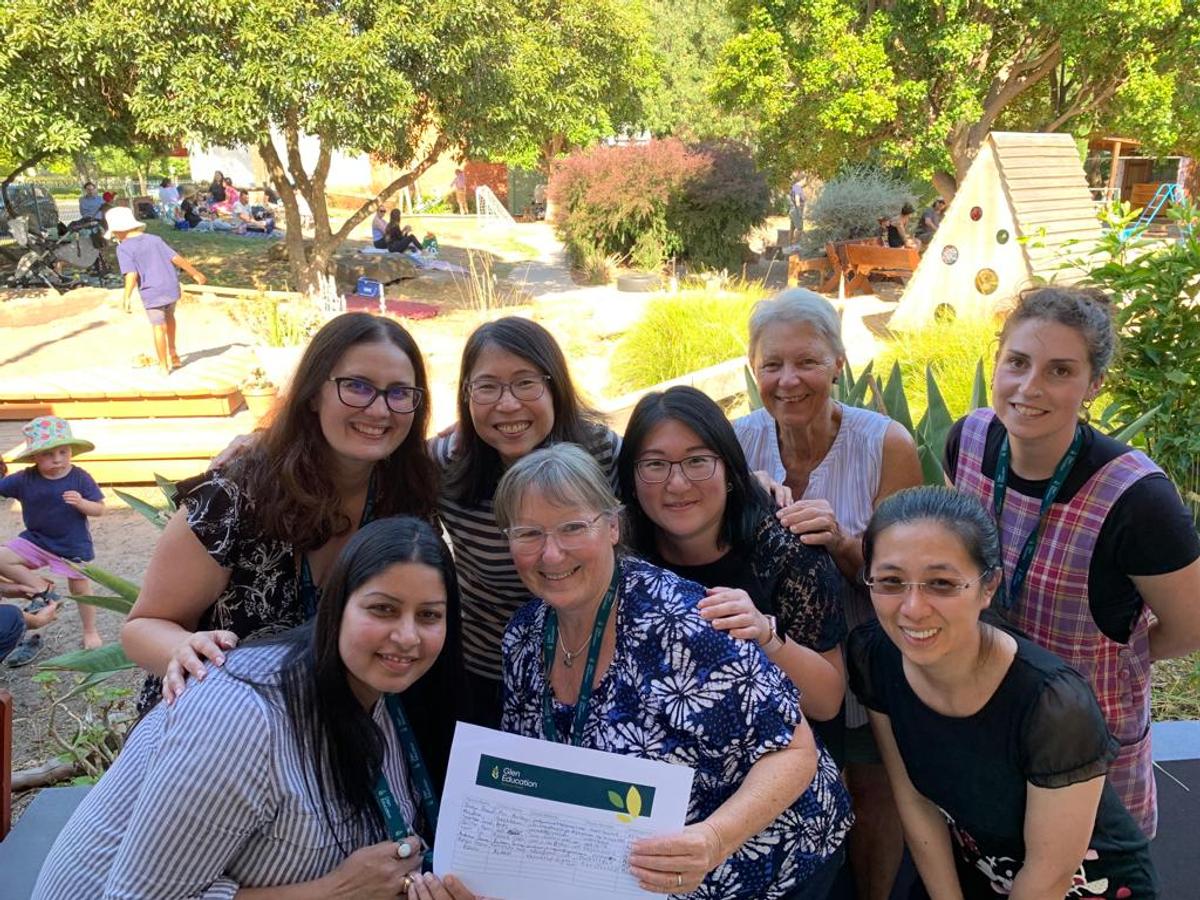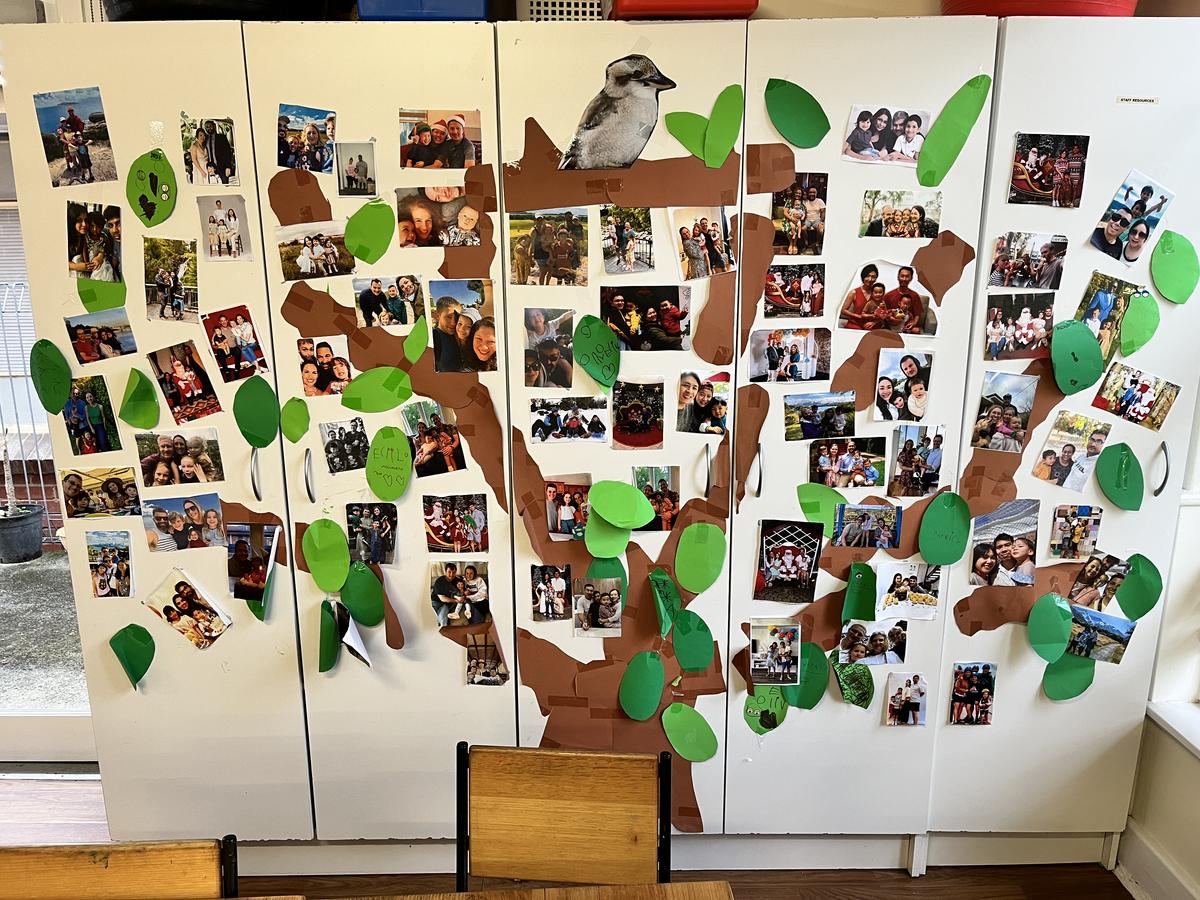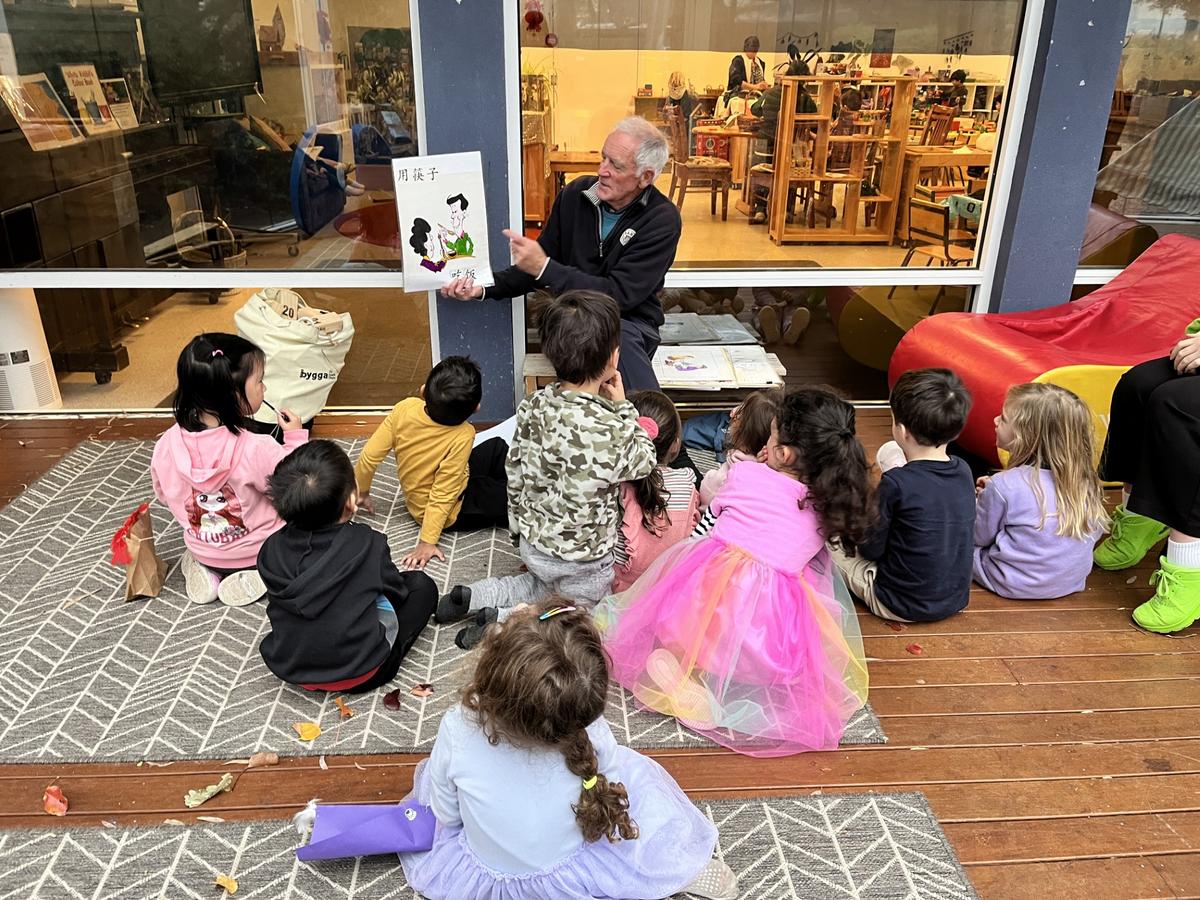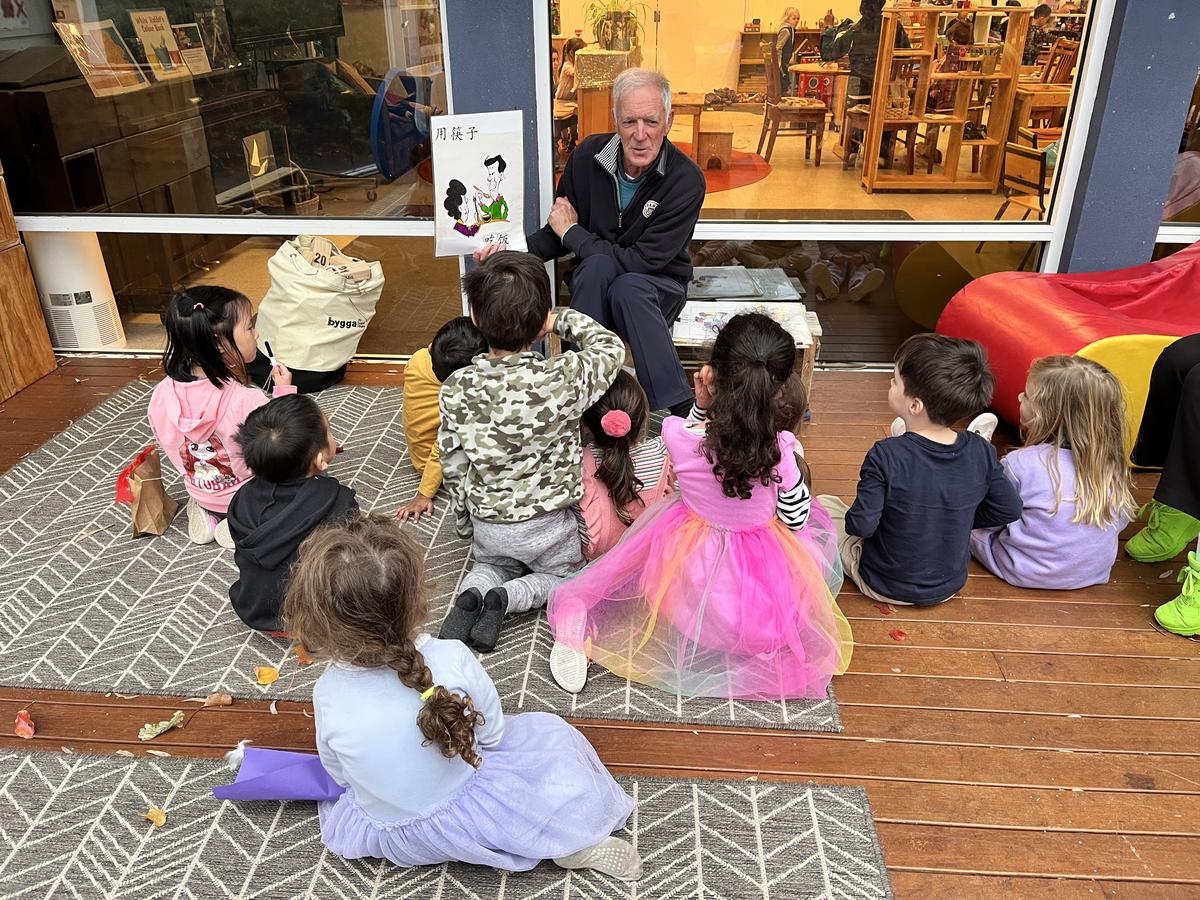Glen Education McKinnon

One Community of Learning
Glen McKinnon Kindergarten Educators
Quality Area 1: Educational program and practice
In December 2022 Glen McKinnon registered for the Early Learning Language Australia program. Consultation with staff and families at the end of last year supported our chosen language of Mandarin due to our kindergarten’s attendance of multi-cultural families.
In 2023 we have now commenced this program, as children and educators begin to learn and engage in the language program our ELLA experiences will extend out across all the curriculum areas as we explore culture through cooking experiences, games afternoons, stories, dance and music. We will embrace the five outcomes of the Early Years Learning & Development Framework, offering the children educators and families a wide range of experiences and opportunities to enjoy learning about culture together, especially as we all become more adventurous in our learning and practice of speaking Mandarin during the session.
As we expand the program throughout the year, we hope to deliver added benefits of
- community engagement
- real links to our program, with language learning embedded in our curriculum.
- connection to our centre philosophy
- real cultural inclusion that is continually extended upon by the children’s thirst to learn more.
- spontaneous use of language by the children and educators in most of the rooms’ experiences.
- Jo Elmer, Early Childhood Teacher
Quality Area 2: Children’s health and safety
In Glen McKinnon Kindergarten, we encourage healthy eating and drinking of water. Educators sit with children during mealtimes and discuss “sometimes” food and “often food” using the dietary guidelines as a reference. Water is the only drink we recommend children to drink at kinder and drinking frequently is promoted to keep us hydrated. We support families to understand why we ask for food to be bought in three different food containers and that there is a variety of food for the child to choose throughout the day, when children know which container is for what and access it without any or with minimal prompts, their independence and agency is promoted. We have sometimes had parents who were concerned that their children were not eating enough during the kinder day, we took this feedback on board and sat with the children to find out more about their eating habits. Some reasons from the children were that they hadn’t tried the food before, or they didn’t like the food. We then had chats with their parents about offering a different variety of healthy food in which there were food their children would like to eat and worked from there. We work together with families to protect children that have allergies, sometimes by asking them to avoid packing certain foods to kinder to minimise the risk, and families are always so understanding and kind and responsive to these requests.
We recognise that “rest” looks different to different children in what can be a busy kindergarten day, so time, space and resources are provided for children to rest in ways that work for them. Children that do fall asleep are respected and other children are redirected as needed. Some children prefer to be alone, we have cubby houses both indoors and outdoors with cushions and blankets for comfort; while others prefer quiet activities, such as reading a story either with an educator or on their own, or doing some drawing – all forms of rest are respected as being valuable for that child.
To promote physical activity and safety for the children within the program, obstacle courses outdoors changed frequently to adapt to the abilities of the children of certain age groups. Swings of different heights that can be swapped out easily, so that younger children can access lowers ones safely.
In term two, we have Susie from Susie Creative dance who comes on Mondays and Thursdays to promote children’s physical development and imagination through expressive and creative dance moves. The children have enjoyed the sessions as they are fun and allow them to express their thought and ideas in their own ways using different mediums such as music, props and their own bodies.
Since the beginning of this term, the temperature has dropped. For children’s health and wellbeing, we provided proper heating inside. During outdoor activities, we reminded children to put their jumpers or jackets on to keep warm. We advised children to go outside and feel the temperature to help them get into the habit of wearing the appropriate clothes for the weather.
Every day we set up various experiences outdoors to ensure children have enough outdoor play. Lots of children loved to engage in water play and muddy play. When they finished the activity, we immediately helped them change into clean clothes. Because wet and cold clothes can easily make children sick.
When the weather was fine, we have picnics outside. Children enjoyed their lunch and warm sunshine. Eating outdoors allowed children to be close to nature. Sometimes, changing to a new environment could stimulate children's appetite and provide them with fun experiences.
- Mandi Lee, Early Childhood Educator
- Jan Leng, Early Childhood Educator
Quality Area 3: Physical environment
We ensure the physical environment is fit for purpose and it is kept suitable for use. For example, the outdoors and indoor spaces, building, fixtures, and fittings are checked to be suitable for purpose to ensure access for every child of all abilities. We perform daily checks to ensure the premises, furniture and equipment are safe clean and well maintained. We maintain records of these checks and note any items requiring removal or repair. We encourage recycling where possible to avoid waste. We offer opportunities for appropriate risk taking and play. We make sure that the service environment is inclusive and promotes competence and supports exploration and play based learning. For example, we added a trampoline to the outdoor space. Children of all abilities can improve their coordination and balance on the trampoline.
We perform daily checks indoors and outdoors. The children are educated about any issues in the physical environment and how to be safe (e.g., finding wild mushrooms in the garden). If items are broken, they are written in the checklist book. Items requiring repair are alerted to WHS to coordinate repairs. The physical environment is discussed in regular team meetings. We liaise with the inclusion support educators to ensure the equipment provided is suitably set up for all children’s abilities. The children are educated on sustainable practices everyday – via the Veggie Garden/Landcare Grant, the recycle bins. Children are encouraged to participate in activities that teach them about sustainability and connecting them with the environment, such as planting veggies. The children are involved in drawing the signs for the veggie patch and educators discuss with the children where the veggie patch should be. The children were involved in naming the veggie patch as the “Glen McKinnon Community Garden”. Educators support the children to recognise the correct bin by the colour of the lid and the picture on it and sort the waste into the correct bins.
For the trampoline, the staff wrote a risk management plan and discussed the rules with all the educators including how many children are allowed on the trampoline at one time. The educators communicate with children about the rules and support children to decide what is a fair turn. A timer is used, and the children are sitting on the waiting bench by holding the timer and communicating to their peers when their turn is up by watching the timer.
On receipt of the Landcare Grant, feedback was sought and received from families on developing the veggie garden. Families made donations of items and others enquired on how to help. Staff are doing professional development on sustainable gardening at Caulfield South Community House, and this will be embedded in the learning environment at the kindergarten. The all children in our kindergarten community are participating in planting veggies and herbs. We connect this practice to families' goals such as developing self-regulation of emotions and making connections with nature as we work with the children and discuss how the process of gardening and caring for the natural world can make us feel calm. Educators are noticing the achievements of the children in reaching these goals and are documenting them in the observations for families to read.
- Deepti Sinha Early Childhood Educator
Quality Area 4: Staffing arrangements
Early Childhood educators are highly sought after professionals. At Glen McKinnon we work together as a team to support each other and achieve our service goals. Educator continuity is important for both the team and the children, as such our team work together to provide continuity by covering each other when needed and ensuring that we build strong relationships with children and families across the whole kindergarten community.
We value the dedication and commitment of our team, who make themselves available to cover additional hours. As a team we are aware that we work best when we support each other and provide opportunities for each person to take the time they need to extend our leaning through professional development or provide cover when important life events occur.
Our passion for the profession has only grown, despite challenges to our workforce over the past few years. Many of our team have taken on the challenge of studying outside of kindergarten hours, and have chosen to up skill, working towards gaining either diploma or bachelor qualifications! At Glen McKinnon, our dedicated, knowledgeable and experienced staff our greatest asset.
- Bridget Di Stefano, Early Childhood Educator
Quality Area 5: Relationships with children
In term one of each year our focus is always on building positive relationships with children and families. We started with asking the children to each bring in a photograph of their family to share with us and the other children. Each room designed and created a family tree with the assistance of the children. This is the first year at Glen McKinnon that we have shifted to a whole service approach to our kindergarten, rather than a group focus. This shift meant that we created one tree for each room to represent all children in the kindergarten, rather than separating by groups. As part of our move to plan and program as a whole service, we reflected that moving forward we would continue to work as one unit.
A family tree encourages the children to feel a sense of belonging, pride, and joy. This way we can ask the children questions about their families, themselves, and their world. We stop and listen to children, we play together, we get down to their level, we eat meals together and we encourage the children to have reciprocal conversations with us. We support the children to feel comfortable at kindergarten so they can continue to learn in a safe and trusting environment.
Some of our 3-year-old children have been somewhat unsettled in the kindergarten environment, for many this is their first time away from home, so we decided to photocopy their families photograph and encouraged the children to hold onto their photo when they were feeling a little upset. Every time a child felt upset, they would look at that photograph, and we would ensure that we continued to ask the child to speak about their family with us. Using this strategy, the children have slowly become more settled, happy and confident.
- Sharon Cashmore, Early Childhood Teacher
Quality Area 6: Collaborative partnerships with families and communities
Glen McKinnon Kindergarten has a commitment to building partnerships with our local community. One example of our partnerships includes our Volunteer Parent Group, which organizes several activities such as working bees to help different tasks such as the maintenance of kindergarten gardens during term breaks. Glen McKinnon Kindergarten has also been in partnership with McKinnon Secondary College in supporting the Duke of Ed students for several years. We also support local community to promote their newly set up small business and services offered in the area by placing their flyers or promotion in the rooms. Glen McKinnon Kindergarten was the host of one of Yarning Circles last year. This facilitated educators from the local networks to visit our kindergarten before and after the meeting and exchange ideas. Glen McKinnon has partnership with several community members such as Susie Creative Dance, Playball and Nerida Yoga to enrich the program and learning experiences to the children.
We recognise that children thrive when families, educators, and the wider community work together in partnership. To encourage collaboration with parents we have implemented an intentional approach to building, strengthening, and maintaining partnerships with families.
During term 1 we focused on building trusting and respectful relationships with families. We encouraged families to spend as much time as possible at the service, especially in the mornings as children are settling into our program. During this time, we have spent much time building an understanding of individual family goals for the year. We have also reminded and encouraged all families to return the “getting to know you” forms and have spent time discussing individual family goals with each family. We always encourage parents to look at their child’s learning portfolio and provide input and feedback.
During the second half of term 1 and onwards, all families have been invited to spend time at the service and share aspects of their family life. Examples include:
- Holi celebrations –families were involved in this special occasion by sharing the various ways they celebrate Holi at home.
- One father joined us for a morning of making paper aeroplanes.
- A visit from a child’s uncle who is a fireman.
- We had two children who experienced significant separation anxiety for most of term 1. During this time, we encouraged these families to spend extra time in the morning to gently support their child through this challenging time. As the child’s anxiety decreased, we invited these families to share some aspects of their family life with the whole group. Both parents have organised a time for this and both children are looking forward to this with great excitement, which will assist the child to build confidence.
- Another parent is starting a new job and will have less available time to spend at kindergarten. We invited this parent to spend a morning with us before starting her new job where she will engage in some craft activities and read the children a story. This will happen in a few weeks and has helped to reduce anxiety felt by both the child and parent about the changes in routine next term.
- Lily’s grandpa came to the kinder to teach the children Chinese (Mandarin) as an extension to our ELLA program. Learning a foreign language sparks children’s curiosity of another culture and broaden their perspectives of the world.
- Winnie Wong, Early Childhood Teacher
- Merilyn Griplas, Early Childhood Teacher

